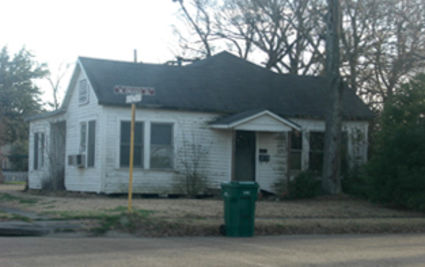Little Orange house tells a love story
Last updated 2/16/2011 at Noon
Leslie Barras, a local resident has uncovered an 80-year-old love story connected to her home in Orange. When Mr. and Mrs. Barras moved to Orange in late 2008, they visited an elder couple who referred to the house near their home as “the Palmer House.” The Barras were interested to know what had taken place in the house. Their concern was certainly justified! Her curiosity solved the “mystery.”
A 1953 article from LIFE magazine put things in perspective. Further research has uncovered news articles from all over the world. The articles, each providing a detail or two, weave a beautiful story. Mrs. Barras uncovered, not a murder, but a love story.
Thomas C. Buntin, 28-year-old son of a wealthy Nashville businessman, disappeared in September 1931, leaving a wife and three young sons. Because of his wild lifestyle and strange fits of passion, Mr. Buntin was thought to be dead, probably by his own hand. Six weeks later, however, Betty McCuddy, his 22-year-old secretary also disappeared.
For many years, friends speculated that the two had run away together. Finally, however, a supreme court judge ruled in 1942 that Thomas C. Buntin was legally dead, reasoning that “such a playboy could not have lived 11 years without help from his family.”
The New York Life Insurance Company, which had been forced to award $50, 000 to the Buntin family was not satisfied with this explanation and continued to look for him with only one clue- the man’s deformed ear. Betty McCuddy, also, had been declared dead in 1938, which excluded her from a $1,000,000 inheritance.
In November 1953, a young John Seigenthaler, now a world famous journalist, was sent in search of Buntin and McCuddy. After much fruitless searching, Seigenthaler by chance, riding a train through Orange, spotted the deformed ear of Thomas D. Palmer. He followed the man home to Orange Street where he lived with his wife and children.
When Seigenthaler questioned the aging couple, Mr. and Mrs. Thomas D. Palmer reluctantly admitted they were in fact Mr. Buntin and Miss McCuddy of Nashville, Tenn.
Mrs. Palmer, concerned for the well-being of her pregnant daughter, begged Seigenthaler for a few hours to get her thoughts together before he told anyone. Within hours, reporters stormed the front porch of their little home. A couple of days later, in the midst of this chaos, the Palmer’s daughter, Elizabeth, gave birth to a stillborn child. Stunned and guilt stricken, Seigenthaler refused to leave the Palmers until a physician assured him that the death had not been caused by stress. When the young reporter offered the struggling couple $1,000 for an interview, they refused, but a beautiful love story began to unfold.
“If money had meant anything to us,” replied Mrs. Palmer, “We would not have done what we did. We were in love.”
Regardless if their relationship had begun in lust or in love, they never gave up on it. Tom’s wild unstable lifestyle did not cease overnight. Times had been hard without the Buntin fortune and social status. Tom, who had never learned how to succeed on his own, went from job to job failing at various trades. Finally, he became somewhat successful at selling television sets. Betty worked night and day as a court secretary to make ends meet. Their affair had turned into a marriage respected by the people of Orange, and a family of eight remarkable people.
The couple had raised a family of six children- Elizabeth Ann, then 21, Dave, 17, Margaret, 16, Duncan, 14, Mary Ellen, 12, and an unnamed eldest daughter. Elizabeth Ann, who had given birth to the stillborn child, was wife to a soldier in the Korean War.
Duncan, who was crippled, was a favorite among his classmates. Dave, a Marine, when he learned of the true identity of his parents called his father “a wonderful guy” and said that if anything the incident “boosted my admiration for my parents, if that is possible.”
Dave was not alone in his defense of his parents’ choice. In fact, the whole town of Orange sprang to the defense of the Palmers. Immediately after the discovery, and in the midst of the death of the Palmer child, the family was surrounded by support and sympathy from friends, fellow church members, and police.
According to the Spokane Daily Chronicle, a reporter from The Orange Leader called the family “highly respected citizens of Orange” and assured them that they were well-liked and welcomed here. Some things never change. We hope that Mr. and Mrs. Barras feel the same way.
Sources:
The Pittsburg Press 29 November 1953
Spokane Daily Chronicle 27 November 1953
Ellensburg Daily Record 26 November 1953
The Mercury 28 November 1953
The Syndney Morning Herald 27 November 1953
Barrier Miner 5 December 1953















Reader Comments(0)